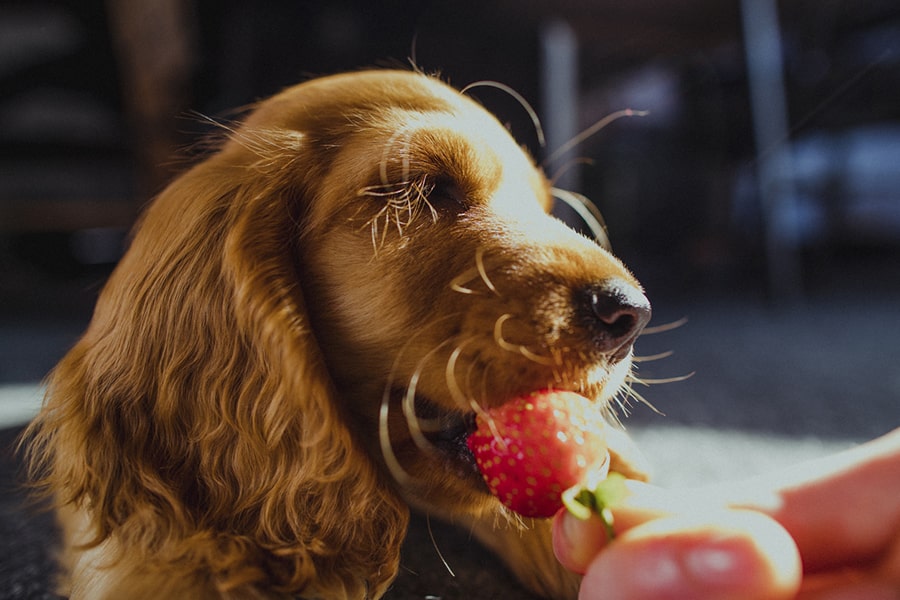
Can Dogs Eat Fruits and Vegetables?
Absolutely! Dogs can eat lots of different fruits and vegetables—and they should eat them since they’re packed with all sorts of healthy stuff. Just be sure to pick dog-safe options like the ones listed here to help avoid tummy upset or more serious problems.
Why Shop for Fido in the Produce Aisle?
For one, it’s perfectly natural for dogs to eat fruits and vegetables. Our dog’s wild wolf ancestors foraged for berries, fruits, and other vegetation. They also ingested the stomach contents of their plant-eating prey, which contain these foods. Kind of gross, sure, but maybe less nasty than eating poop?
In addition, fruits and vegetables can help round out your dog’s diet with a wide range of nutrients, including vitamins, antioxidants, and fiber. They even have some good things that you won’t find in meat, like B vitamins.
Plus, they’re an excellent source of water. Fruits and vegetables, particularly H2O-packed options like cucumbers and watermelon, are a great way to help make sure your dog stays hydrated when the weather is hot.
Last but not least, they can make a wonderful alternative to store-bought treats. Those treats can be full of sugar and unhealthy fats, which can cause your pup to put on the pounds. Help keep your dog stay healthy by training them with bits of apple, carrots, or banana instead.

Freeze apple slices or watermelon to give your dog an extra cool and hydrating summer snack.
How Should I Serve Them?
You can offer your dog raw fruits and veggies or steam them to soften them up a bit. Just be sure to cool them down before you give them to your dog to avoid a painful burned tongue or gums. Don’t cook them too long or you’ll lose a lot of those wonderful nutrients.
And avoid adding any salt, seasoning, or sauces. Your dog doesn’t need them, and they could upset their stomach.
Depending on the type of produce, you may need to cut it up into bite-sized pieces to help make sure your dog doesn’t choke on them. You should also remove any rind, pits, or seeds, which can be harmful to dogs.

What Fruits Can Dogs Eat?
There’s a long list of fruits that your dog can eat. Here are some of our faves.
Apples – An apple a day keeps the doctor away for your dog too! Apples are a great source of vitamins A and C. They’re also packed with healthy fiber. Be sure to remove the seeds and core before you give them to your dog.
Bananas – These yellow fruits offer vitamins, potassium, and fiber, which makes them a great treat for dogs. They even come in their own convenient packages, so they’re easy to take along when you go out with your pooch. Keep in mind that they have a high sugar content, so don’t go bananas with them. Offer them in moderation only.
Blueberries – These antioxidant-rich berries are healthy for your dog. They’re also an excellent substitute for treats if you like to toss food to your dog in the air.
Oranges – You can offer your dog an orange slice (with no peel or seeds) for a vitamin C boost, but they may turn their nose up at it. Dogs don’t always like the strong citrus smell and taste of oranges.
Pears – A fresh and ripe pear slice (without pits or seeds) makes a great snack. Avoid canned pears and fruits in general. They’re usually covered in sugary syrup that is no good for your dog.
Strawberries – These red berries offer your dog lots of fiber and vitamin C. But, like bananas, they have a high sugar content, so don’t go overboard with them.
Watermelon – This juicy treat is fine for dogs. Just cut away all of the rind and remove the seeds—or splurge on the seedless variety. Watermelon contains loads of water, so it’s a great way to keep your dog hydrated. That water can also make it pretty messy to eat, so you may want to save watermelon as an outside snack.

How ‘Bout Veggies?
Dogs should eat their veggies. This list of dog-safe ones is a great place to start.
Broccoli – It may be the veggie kids have nightmares about, but lots of dogs enjoy these tree-like snacks. Make sure you cut them up into bite-sized bits so your dog can’t choke on the stalk or florets. And beware—some dogs can get mighty gassy if they eat too much broccoli.
Brussel Sprouts – Brussel sprouts are trending these days! It’s no wonder because they’re loaded with vitamins and antioxidants. But like broccoli, they can cause your dog to clear a room, so don’t overdo it. Also, keep them plain and healthy. Avoid smothering them in bacon or fancy sauces.
Carrots – What’s up, doc? Carrots aren’t just for rabbits. They make a great crunchy snack for your dog that’s full of vitamins and fiber. They can also help clean their teeth.
Celery – Not only does celery offer healthy nutrients, but it can also freshen your dog’s breath. Add a smidge of xylitol-free peanut butter to make it an extra special treat.
Cucumbers – This vegetable is full of vitamins and packed with extra hydration for your dog.
Green Beans – Lots of dogs love green beans, either steamed or raw. Keep them plain with no butter, salt, or other seasonings. Your dog doesn’t need the extra calories or sodium. Plus, some seasonings may give your dog a tummy ache.

What Fruits Are No-Nos?
Here are a few fruits you should never, ever feed your dog.
Avocados – Why yes, avocados are a fruit. They’re actually a single-seeded berry—and you should never give them to your dog. The outer skin, pit, and leaves contain a substance called persin, which can cause vomiting and diarrhea. The inside of an avocado doesn’t have that much persin in it, but it’s still better to avoid it entirely.
Grapes – Never feed your dog even a few grapes. They are highly toxic to dogs and can lead to kidney failure, which can be fatal. Early signs of grape poisoning in dogs can include vomiting, diarrhea, appetite loss, and abdominal pain.
Raisins – Raisins are just dried-up, shriveled-up grapes, so the same goes for them.
What Vegetables Can Dogs Not Eat?
Your dog should also steer clear of these harmful veggies.
Garlic – Garlic contains substances that can be toxic to dogs. A small bit of garlic probably won’t harm your dog, but the toxicity can build up over time and cause damage to your dog’s red blood cells, which can be very dangerous.
Onions – Hopefully, this news won’t bring tears to your eyes, but you should never feed your dog onions. They contain the same toxic substances as garlic. Make sure your dog can’t snatch an onion ring off of your plate and avoid offering them a bite of sandwich that has onions.
Mushrooms – Some wild mushrooms can be toxic, so it’s best to leave them off your dog’s menu. Well-washed, white mushrooms from the grocery store may not cause a problem, but why tempt fate?
Tomatoes – The ripe insides of a tomato are generally safe for dogs, but the green part of the plant contains a harmful substance. It’s best to play it safe and have your dog pass on the tomatoes.

Tomatoes are generally considered to be vegetables by nutritionists and chefs, but scientists group them as fruits.
My Dog Ate a Bag of Raisins. Now What?
Stay calm if your dog ate raisins or any other harmful fruit or vegetable. Dogs can pick up on our emotions, so they may start to lose it if you’re freaking out. Plus, you’ll be better able to help your dog with a clear head.
Contact your veterinarian or animal poison control immediately. They can help determine the severity of the situation and the best next steps. In the case of a bag of raisins, you’ll probably need to take your dog to the clinic or an emergency animal hospital for treatment right away. Your dog may need medication, IV fluids, and hospitalization depending on the situation.
If you have our pet insurance, all of that and more is covered. It can be a big relief to know you’ll get reimbursed for some of your costs when something scary happens to your dog. Pet insurance also has some benefits over saving up for your dog’s care.





